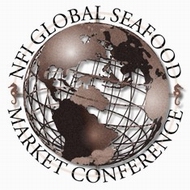 The opening session at the Global Seafood Market Conference in Santa Monica, Calif., presented attendees with a wide variety of variables impacting the U.S. seafood supply.
The opening session at the Global Seafood Market Conference in Santa Monica, Calif., presented attendees with a wide variety of variables impacting the U.S. seafood supply.Data from the USDA World Agricultural Supply and Demand estimates and the National Oceanic and Atmospheric Administration shows that all protein consumption categories are declining, with seafood having an opportunity to increase its market share. Recent per-capita consumption trend and 2012 forecasts for all U.S. protein consumption show only five instances of increased per-capita consumption. This could be a result of an aging U.S. population and reduced portion sizes, as well as possible reaction to price increases across center-of-plate proteins.
Duane Lenz, manager of operations and analyst services at Cattle-Fax, presented comparative protein information so attendees could see how seafood chalks up. Seafood species comparisons with cuts of beef such as sirloin and ribeye steaks and brisket showed that seafood is competitive on price.
Global aquaculture production was also discussed during the GSMC opening session. Farmed fish present several opportunities for increased global seafood supply, and is the world’s fastest-growing food production system, according to data presented by James Anderson, fisheries and aquaculture advisor for the World Bank.
When asked whether the word “aquaculture” will have any impact on future demand, Anderson rejected the notion. "The aquaculture industry could do better job in messaging and make the case it’s one of the most efficient forms of agriculture there is,” said Anderson. “For the bulk of the market, I am not convinced they really care whether product is farmed or wild. Especially, when you look at the global market. China cares about food safety and quality, but they don’t care that much if it’s farmed. Globally, I think the [farmed] distinction will be less important in future.”





